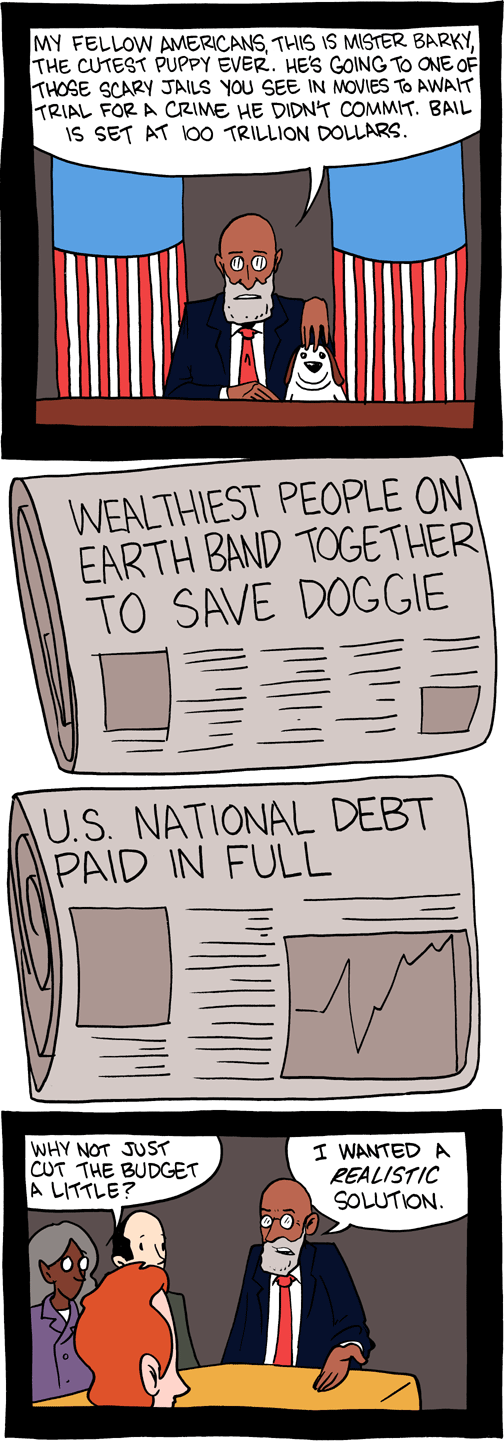 |
| I just thought this too funny to not put on here. |
I'm like most Americans, I think. This whole political brinkmanship, infighting and partisanship has bugged me since I actually started paying attention in undergrad. I suppose its no surprise that its come to this, I have a few friends who are hard-line and unforgiving in their ideology (or should I say dogma) on both ends of the spectrum. I hate talking politics with them, you can guess why... there is no room for them being wrong, not even in the slightest. They are ideologues.
I'm no foreigner to the mindset of an ideologue. I think I expressed the fact, even though never clearly stated, that I myself was an ideologue in several areas at one time. I have since grown out of that; at least I don't think I'm still an unforgiving, dogmatic to a fault ideologue. I am an idealist, yes, but I have been tempered by reality. (What does that make me an idealist realist, or a realist idealist?). Which means I know that I very well could be wrong in many things; I need only experience or reasoning far more sound (not louder) than mine to prove it, as has been proved in the past. OK, I guess I still can be an unforgiving jerk, but that's only because some people's reasoning is faulty... but does that make a a jerk or an ideologue? ...it's a rhetorical question, don't answer it.
Even still its difficult not to be an ideologue. We are all informed by ideals and, thus, an ideology. Even the apathetic are set on the ideal of apathy. And I find that my main qualm is with ideologues in the arena of theology/philosophy and politics...
Oddly enough these are the arenas that also seem to be the most hotly debated and divisive.
No wonder politics and religion don't have a place at the dinner table.
It makes sense, however. These areas of thought form the system in which we live and breathe, politics, the grander societal system, and theology/philosophy, the personal one that. And whether one likes it or not, the personal one informs the grander one. This is why its hard not to be an ideologue... your identity is wrapped up in it. If your politics are wrong, then perhaps your theology/philosophy that informed the politics is wrong. If your theology/philosophy is wrong, then not only are your politics wrong, but you have been wrong about the physical and metaphysical world and you've been interacting with it all wrong (its difficult to admit the connections, but I think they are true and operate in a very subconscious way). An issue arises, who you are is no longer who you should be; unfortunately, you haven't yet figured out who you should be, so (and this is the root of the problem) you don't know who you are; you've lost your identity.
What I want to say is that it was my prior humblings that made me the realist that I am, but then I wonder why I was humbled when proved wrong and others are only more fortified. It throws a cog in my ideal, that people need to be humbled to know that they are wrong, and that as people become humbled they would develop. The answer then is not solely experience, which is unfortunate, because everyone experiences life and experiences being wrong. If that was the answer, then ultimately we'd all come to a point, sometime, hopefully, of being able to live together in a utopia. Seeing, however, that is not yet the case, after the many thousands of years of civilization and man's existence, the problem surely is elsewhere.
This is where identity comes into play. My prior humblings in areas of politics and theology/philosophy didn't effect my identity. Why? Because I know such things are temporal. When I die politics won't matter, and neither will theology or philosophy. Politics, because, well, I'll be in a place where politics obviously don't matter. Theology/philosophy, I'm sure that when I die my theology and philosophy will be proved wrong, because I know that any thoughts I have about God and the way the world works are limited by what I can know and I know that I can only know very little.
I would say then, that my identity is eternal. I want to find myself connected to something that will be real and meaning when I die just as much as it is now.
This means that I cannot ascribe to myself my own identity. I am a temporal being and there is no way that I can come up with an identity that will not change forever. Thus, my identity must come from something eternal, it must be given to me. This comes with its own set of ideals and I, as I have said, am still an ideologue because of this (though I couldn't tell you specifics, I'll just say I'm pretty sure this is probably true). However, I am free to be wrong about many other ideals that I have, such as in politics and theology/philosophy, because even though I am wrong, I am still who I am and nothing I can be right or wrong about will change that.
I can really speak only from the authority of experience that it's very freeing to be wrong. It's freeing to know that you can be wrong about everything and yet still be confident that who you are is right.
No comments:
Post a Comment